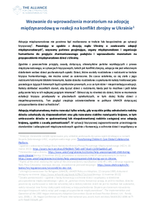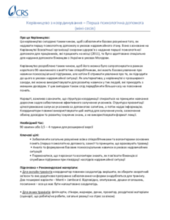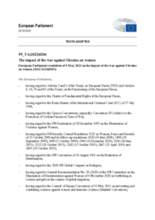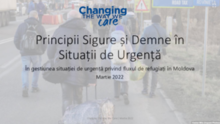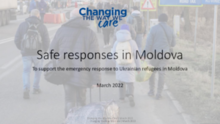Displaying 11 - 20 of 239
During emergencies, such as conflict, it is a well-accepted principle of States’ obligations under international law that adoption is not an appropriate response for unaccompanied and separated children. This is a joint call for a moratorium on intercountry adoption in response to the conflict in Ukraine. In line with the Ukrainian Government’s suspension of intercountry adoption, the joint statement urges receiving States, international bodies, and humanitarian agencies to adopt a harmonised approach and call for a moratorium on intercountry adoptions from Ukraine.
Adopcja międzynarodowa nie powinna być realizowana w trakcie lub bezpośrednio po sytuacji kryzysowej. Pozostając w zgodzie z decyzją rządu Ukrainy o zawieszeniu adopcji międzynarodowych, wzywamy państwa przyjmujące, organy międzynarodowe i organizacje humanitarne do przyjęcia zharmonizowanego podejścia i wprowadzenia moratorium na przysposobienie międzynarodowe dzieci z Ukrainy. Zgodnie z powszechnie przyjętą zasadą dotyczącą obowiązków państw wynikających z prawa międzynarodowego, w sytuacjach kryzysowych, takich jak konflikt zbrojny, adopcja nie jest właściwym działaniem wobec dzieci pozbawionych opieki. Dzieci, które zostały rozdzielone z rodzicami w trakcie kryzysu humanitarnego, nie można uznać za osierocone. Do czasu ustalenia, co się stało z jego rodzicami lub innymi bliskimi krewnymi, każde dziecko rozdzielone z opiekunami należy traktować jako posiadające żyjących krewnych bądź opiekunów prawnych, a co za tym idzie – niepotrzebujące adopcji.
In this workshop Family for Every Child members Flüchtlingsrat Niedersachsen (The Refugee Council of Lower Saxony, Germany), Programma Integra (Italy) and METAdrasi (Greece) share their experience around supporting unaccompanied minors, with For Our Children (FoC) in Bulgaria. They share top tips with FoC as they navigate the arrival of unaccompanied minors fleeing the conflict in Ukraine, and find ways to support them.
Це керівництво складено таким чином, щоб забезпечити базове розуміння того, як надавати першу психологічну допомогу в умовах надзвичайного стану. Воно засноване на Керівництві Всесвітньої організації охорони здоров'я з надання першої психологічної допомоги для працівників, які працюють на місці (2011), та було адаптоване спеціально для надання допомоги біженцям з України в умовах Молдови.
This report follows the route of asylum seekers arriving in Tapachula. It draws on a March 2022 visit during which the researchers conducted field documentation and interviews with asylum seekers, government officials, UN agencies, and civil society organizations providing services to migrants. The report highlights abuses, arbitrary treatment, and steep obstacles faced by asylum seekers at each step of their process.
Această instruire a fost concepută pentru asistenții sociali din Moldova care lucrează cu asistenții parentali profesioniști care au în plasament copii și adolescenți neînsoțiți și separați, veniți aici din cauza crizei din Ucraina.
The European Parliament adopted a resolution on the impact of the war against Ukraine on women on 5 May 2022.
Instruirea „Principii Sigure și Demne în Situații de Urgență” oferă spre discuție subiecte importante precum responsabilitatea noastră de a proteja copiii și adulții expuși riscului în situația de urgență actuală; principiile „de a nu face mai rău
The training Safe Responses During Emergency Situations covers topics such as our responsibility to protect children and adults at risk in an emergency, the principles of 'do no further harm’ and 'best interests of the child’ in practice; the four Rs: recognition; response; reporting; recording and what we can and should practically do in an emergency situation.
Ce document fournit des conseils sur la manière d'appliquer les normes internationales lorsque vous travaillez avec des enfants et leurs familles touchés par cette crise. La question à poser, systématiquement - quelle que soit la décision, l'action ou le processus - est "qu'est-ce qui est dans l'intérêt supérieur de l'enfant?" Cela s'applique à des situations sur le terrain qui sont complexes et ne permettent pas de réponses faciles.


